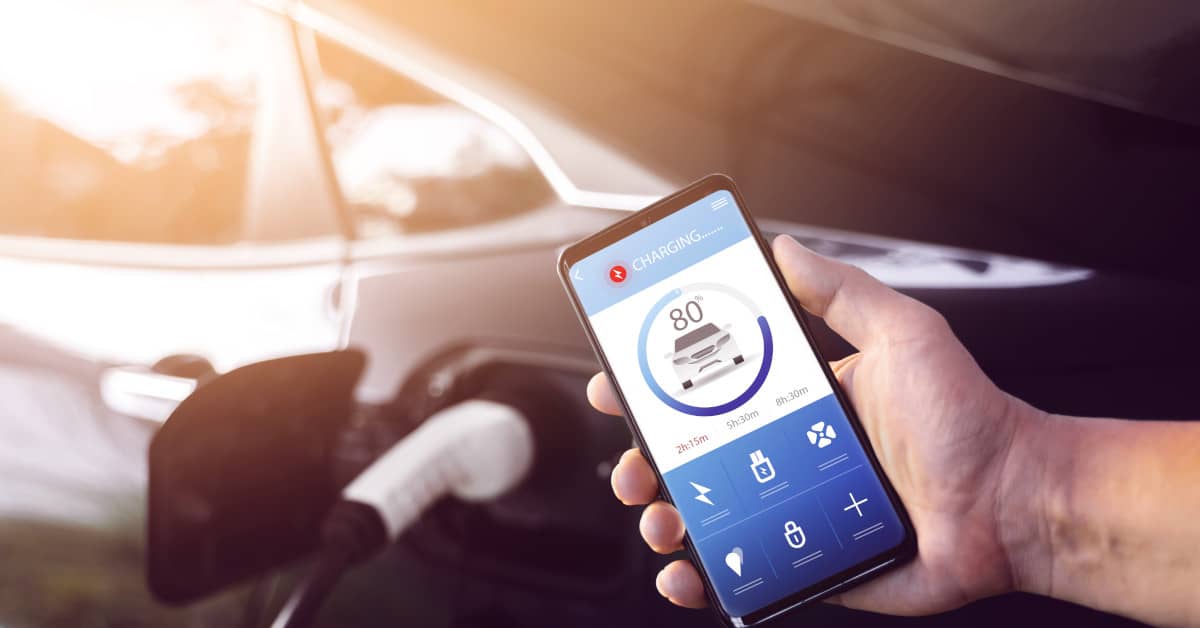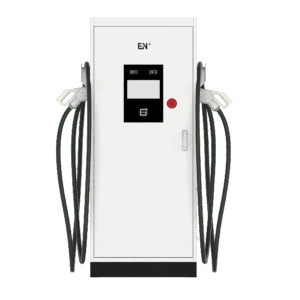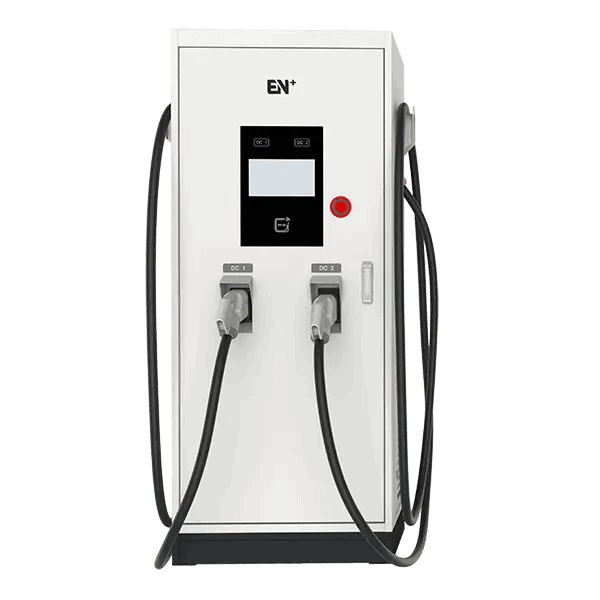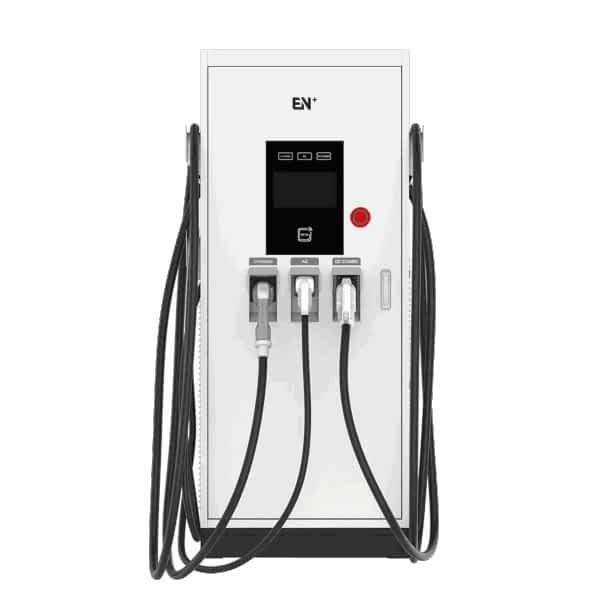Best Commercial EV Charging Stations – A Market Overview

Electric mobility is taking up more and more space in our everyday lives. With it comes a growing demand for more efficient commercial EV charging solutions.
In this guide, we provide a concise overview of the European market and EV charging companies. Furthermore, we discuss the current state of EV charging technology and present the best commercial EV charging stations for different solutions.
Table of Contents
Overview

EV Market in Europe
The EV market is still young and there is ample opportunity with a level playing field. Businesses need to innovate in different directions to stay competitive. Economic supply chains with access to the best EV charging companies will afford new players an edge in this market.
EV Charging Technology
There are exciting news in the EV charging industry almost every month. Discover the latest trends in EV charging research and their implications for the future of the industry.

Cost
As with any business model, a cost/benefit calculation for a commercial EV charging solution is a necessary first step. With the right business model, the cost of commercial charging stations is negligible compared to the enormous profit potential.

EV Charging Companies
Connect with our global EV charging network of manufacturers to implement your projects with maximum efficiency and minimum cost. All EV charging businesses are welcome to join.

Get In Touch With Us
Get in touch with us to enquire about our commercial EV charging solutions. You can also schedule an appointment for a free and noncommital discovery call.

Payment & Management System
There are different approaches to provide customers with access to charging devices , process payment and collect customer data. Each approach has it’s own strengths and weaknesses and are suitable for different applications.

EV Charging Solutions
Providers need to keep innovating to stay ahead, as commercial EV charging stations are becoming increasingly important as public facilities.
The Electric Vehicle (EV) Market in Europe
The EV market in Europe is just getting started. With more and more EVs entering the market, revenues of electric recharge stations will soar, potentially reaching €36 billion by 2030. This is a sevenfold increase from 2021 and represents a huge growth rate of around 25% per year.
Looking at the world’s biggest markets, Europe clearly outranks Asia and the US with ~ 1300,000 car sales in 2020. This translates to a growth rate of ~130% compared to 2019. As shown in the graphic below, Europe contributes by far the largest share of global EV market growth.

Source: Global EV Outlook 2021
It is easy to see why EV charging presents enormous opportunities for a variety of business models. A breakdown of the European EV market into it’s constituents yields an overview of it’s most profitable elements.
Guide to EV Charging – Market Subconstituents
- Manufacturing: The major part of the EV charging industry is represented by commercial EV charging station manufacturers and EV charger accessories.
- Commercial providers: Operators of all types of electric car charging points by property owners of (semi-)public charging infrastructure.
- Technical providers: Providers of management software, technical service hotlines, and maintenance services.
- E-MSP (electric mobility service provider): Payment providers for public charging infrastructure. This includes transaction fees of customers as well as roaming fees of CPOs and MSPs.
- Energy management: Smart charging services for optimization of EV driver charging behavior on power connection level. This also includes the provision of balancing power to the grid by pooling grid-connected EVs.

Commercial EV Charging Stations Cost
Generally, the purchase and installation cost of commercial chargepoints ranges from €2000 (GBP 1710) to €6000 (GBP 5135). Most European countries have grant schemes for a commercial ev charging station installation. This can save up to 75% of the charging point installation cost.

Income of Commercial EV Charging Points
Commercial EV charging providers have to assess costs and income in advance to determine the most economic approach to their goal. For the following calculation, we assume an average price of 0.20 € per kWh. Note that this is based on average European prices which are subject to change.
The average EV driver charges their car 250 days a year. Assuming 25 kilowatt hours per charge and a cost 0.24 €/kWh, the average profit is 0.04 € per kilowatt-hour.
The resulting daily profit will be 1 € per customer, totalling 250 € per year and customer.
Profit and Payback of a Commercial EV Charging Station
The annual cost of running a commercial EV charging installation depends on product and business model. However, it is unlikely to cost more than €50 per charger per year in data charges and/or time. As a result, you can expect a profit of €200 per year and customer.
Thus, even with only one user per day, most EV charging points pay for themselves in 6 years. With two users per day, the payback period drops to less than 3 years.

How much money your EV charging business can make depends on a number of factors. The amount of traffic, customer parking time and served parking spaces are have a major impact on your revenue.
Use our free consultation service for a precise cost benefit analysis of your EV charging project.

Commercial EV Charging – Payment & Management System Solutions
EV Charging Payment
- “Plug and Play” – simply plug the charger into the electric car charging port.
- App control – a mobile app gives you access via smart phone.
- RFID card – like a credit card, you swipe the card to start charging.
How to Use Public EV Chargers with Plug & Play
This simple method is similar to conventional refueling of fuel-based cars. Simply take the charging cable and plug it into the car port to have the car charged automatically.
Plug & Play requires no identification procedure and allows for instant access. Therefore, it is the most convenient for free electric car charging stations. However, providers who want to collect customer data or provide automatic billing have to use a different approach.
If you are planning to install a Plug & Play charger for a free EV charging station, we recommend the FC60 “Turbo”. With an integrated type 2 plug being for AC slow charging, it is perfect for free charging services. In addition, the DC60 can be operated through RFID authentication, which could be used for paid charging via CCS2.
Best Plug & Play Charger: DC60 “Standard”

Key Features
- Best Charger for Plug & Play Applications
- Max. Power: 60kW
- Plugs: 2xCCS2, 1xType 2
- Output Voltage: 150V~500V
Operating Modes
- Plug & Play
- RFID Authentication
- Cloud Access for Operators
- Ethernet/WiFi-Support
How to Use Public EV Chargers with App Control
App control is one of the most popular methods for rapid charging stations. As opposed to an RFID card, the app of the respective EV charging service can easily be downloaded on the spot. This comfort is particularly desirable in places where people are in a hurry, like motorway services or gas stations.
Any user with a smartphone can access the device and automatic billing or customer data collection can be implemented easily. Also, apps allows for integration of public EV charger maps so customers can easily find your electric car charging points.
The downside of this approach ist that every network requires its own app, possibly causing inconvenience to customers. Also, keep in mind that both provider and customer depend on good signal quality to access the service properly.
Best App Control Charger: FC120 “Rocket”

Key Features
- Best Charger for App Control Solutions
- Max. Power: 120kW
- Plugs: 2xCCS2
- Output Voltage: 200V~1000V
Operating Modes
- App Control
- Plug & Play
- RFID Authentication
- Cloud Access & WiFi
How to Use Public EV chargers with RFID Card
RFID cards are best for providers who want to offer personalized access to customers. Automatic billing and customer data collection can be implemented in different ways, for example using a cloud-based solution. It does not depend on signal and ensures that only the card owner has access.
However, as a provider, you have to make sure that the cards can be reliably issued to customers. Usually, this is done either by postal delivery or collection by the customer at one of your charging points. RFID solutions require that customers to carry a card for each network they intend to use. Also, the security of RFID cards is not optimal, as they are susceptible to card-cloning and theft.
The RFID method is used in a broad range of EV charging solutions. Therefore, the best choice for an RFID-based solution mostly depends on the specific needs. All products from our DC EV chargers line support RFID authentication. For expert advice on your specific project, we recommend to schedule an appointment for a free and noncommital consultation with us.

EV Charging Technology
DC fast charging stations enable much quicker charging than conventional AC home chargers. This naturally makes them the means of choice for commercial providers. For example, 15 minutes on a 150 kW device charges an EV for a range of 200 km.
![]() INFO: Generally, a 22kW DC charger can fully recharge an EV like the Nissan Leaf in less than two hours. Rapid and ultra-fast DC chargers will charge your electric car even faster.
INFO: Generally, a 22kW DC charger can fully recharge an EV like the Nissan Leaf in less than two hours. Rapid and ultra-fast DC chargers will charge your electric car even faster.
There is rapid progress in the field of fast charging and battery technologies. In particular, drastic reductions in charging times are expected in the near future. Our rapid chargers use cutting-edge technology and are suitable for a wide range of commercial EV charging solutions.
Generally, a DC charger converts supplied AC power into DC voltage with an integrated AC-DC converter. There is also a channel for data transmission to provide vehicle and battery state of charge information. Vehicle information and owner data are transmitted via dedicated secure data channels for billing purposes.
Cutting-Edge & Reliable: DC Fast Series


EN Plus DC fast chargers are more than just electric car chargers. They are equipped with several next generation features to provide maximum convenience to customers and operators.
Payments are processed easy and fast directly at the terminal via RFID card. EV smart charging solutions can be realized through the EN cloud platform.
Compatibility with tomorrow’s requirements is guaranteed. Thanks to the exclusive cost advantage of our supply network, this low-risk/high-reward investment pays for itself quickly.
- Fast & Ultra-fast DC charging
- Simultaneous charging of up to 3 cars
- Three Phase Charger
- Intelligent Control
- Load Balancing
- CC2S/Type 2/CHAdeMO
Key Goals of EV Charging Technology
Research and Development in EV charging generally aim at three main goals:
- Lower cooling effort
- Minimum system size
- Maximize power density
High power density requires forced air cooling, which is standard today. Liquid cooling methods are being investigated for next generation charging solutions.
Compact designs require higher switching speeds ranging from 32 to 100 kHz. This allows for the smallest possible magnetic components to be installed.
EV Charger Types
The first step for anyone wishing to install a commercial EV charging station is to learn about the various types. Chargers are available in a variety of classes to suit different needs and purposes – both corporate and personal.
In Europe, there are three primary types of chargers: Slow, fast, and rapid/ultra rapid charging points. The name hints at what to expect – each has a different power output and hence charging speed.
- Slow chargers may charge up to 3.6 kW, take 6-12 hours to fully charge, and are most typically used at home.
- Fast chargers fully charge with 7kW-22 kW in 3-5 hours. They are now the most prevalent form of public charging outlet.
- Rapid and ultra rapid charging and offers power outputs ranging from 50kWh to 300–350kWh. Vehicles can fully recharge in as little as 30 minutes. Rapid chargers are typically found in big shopping malls, parking lots, and highway service stations.

EV Charging Companies
JustWe is building a growing network of manufacturers and service providers to maximize comparative advantage and labour division. In so doing, we can guarantee for continuous cost reduction and a holistic renewable energy infrastructure.
Our EV Charging Supply Chain Services:
- Wholesale EV charging equipment
- Single parts for mass production
- Complete business & home charging solutions
- Mediation of OEM/ODM companies for manufacturers
- Long-term cooperations with our partnering manufacturers for retailers
- Sustainable supply chains for production sites
Our EV Charging Manufacturers Network
Our partners and in-house brands work closely together to concentrate technological know-how from different areas. This way, we can provide EV charging components and solutions of the highest quality from a single source. Our network is equipped for all design challenges that come up when developing different EV charging solutions.
Our global network connects with partnering manufacturers, maintenance services and specialist providers. This allows for a smooth implementation of EV charging solutions from start to finish. We provide you with access to high-quality devices in a way that is economic and sustainable.
Through our network, we are able to maximize opportunities and minimize costs for clean energy businesses.
JustWe EV Charging Network


- Company: EN Plus
- Location: China
- Web: www.en-plustech.com
- Sector: Manufacturing
- Category: DC Fast Chargers, EV Home Chargers
- Products: DC Fast Series
- Company: Tongou
- Location: China
- Web: www.elcb.net
- Sector: Manufacturing
- Category: EV Charger Accessories
- Products: Circuit Breakers
- Company: Sanco
- Location: China
- Web: www.sanco-china.com
- Sector: Manufacturing
- Category: EV Charger Accessories
- Products: Plugs & receptacles
- Company: BRS
- Location: China/France
- Web: www.brs-china.com
- Sector: Manufacturing
- Category: EV Home Chargers, EV Charger Accessories
- Products: Parts & Chargers
Commercial & Business EV Charging Solutions
The demand for environmentally friendly solutions is increasing rapidly. Businesses and public institutions need to determine how to reliably provide electric charging points to road users, employees and customers. Our response to current market dynamics are customized solutions that are suitable for a broad range of commercial and public projects.
Our EV Charging Solutions:
- Workplace electric car charging stations
- Electric charging stations for corporate fleets
- Wholesale equipment & supply chain solutions for distributors
- Electric vehicle charging points for gastronomy businesses
- Rapid charging points for car parks
- EV charging networks
- Free car charging points
We connect a broad range of industrial & commercial leaders in the EV charging sector. This allows us to provide flexible EV charging solutions with real value to virtually all business types. To inquire about our solutions for your project, please contact us or schedule an appointment for a noncommital discovery call.

Read More: Workplace Charging

Emerging EV charging infrastructure opens up a whole range of opportunities. With EV sales in Europe skyrocketing, businesses respond to this development by offering workplace charging. Different business types have to determine which kind of EV charging points is best for their intended goals. Read more »
Commercial EV Charging FAQ
How Much Does it Cost to Charge a Tesla in the UK?
For Tesla drivers, the Tesla Supercharger Network includes charging stations across the UK, many of which are free for older vehicles. Those who purchased their Tesla after January 1 2017, may only be eligible for a limited number of free charging hours.
- Tesla owners will be charged 26p per kWh (kilowatt hour) whenever possible, according to Tesla.
- In other regions, charging is per minute.
- Per-minute billing uses “Tier 1” and “Tier 2” to account for different charging speeds.
- Tier 1 is defined as 60 kW and below, while Tier 2 is defined as 60 kW and above.
- According to Tesla, Tier 1 costs half the price of Tier 2.
Model S and X vehicles purchased before November 2, 2018, will receive an annual Supercharger credit of 400 kWh (1,000 miles).
If in doubt, please contact the manufacturer.
How Much Does it Cost to Charge an EV in the UK?
For a standard 60kWh battery EV and a 200-mile range, the costs are as follows:
- Home EV charging system: One charge from flat to full costs around £9.20.
- Workplace EV charging: Depends on business/usually free.
- Public EV charging: Usually free.
- Rapid charging: £6.50 for a 30-minute, 90-mile charge.
What's the Cost of a Commercial EV Charging Installation?
The cost of installing a commercial EV charging station varies based on a variety of factors. Generally, you can expect to spend between $5,000 and $50,000 per station. This covers the charging unit itself as well as the installation cost.
The installation cost itself is determined by a variety of factors, including:
- Number of charging devices
- Charger capacity
- Labor
- Permits
- Taxes
- Location
What are the Associated Costs of Operating a Commercial EV Charging Station?
You’ll need to factor in infrastructure and installation expenses to determine these costs.
Infrastructure costs will be the highest and will be determined by:
- Supplying electricity to commercial EV charging stations
- Electrical conduit and wire labor and material expenditures
- Digging
- Pouring fresh concrete
- .Electrical panel labor and materials
- Network costs (cloud-based/online management systems)


